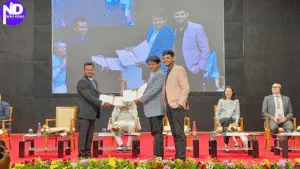Gujarat Gets A Major Boost With Farmton Foods Plant
Newzdaddy Health And Fitness Updates
Somnath Group’s subsidiary, Farmton Foods Pvt. Ltd., has signed a Memorandum of Understanding (MoU) with the Government of Gujarat at Ganpat University, Mehsana, during Vibrant Gujarat, announcing an investment of INR 580 crore to develop a greenfield facility for frozen potato products. The move further reinforces Gujarat’s position as India’s leading agri-processing hub.
Gujarat has already established itself as a centre for agribusiness, particularly the production of potatoes, which makes this investment significant. More than 25% of India’s total potato production comes from Gujarat, according to official figures. Establishing a frozen potato plant improves exports, stabilises farmer markets, and fortifies the whole value chain—from production to processing. The facility is being built in the Mehsana area, which is well known for its rich soil and strong irrigation system, making it the perfect place for such initiatives.

“This Memorandum of Understanding is an investment in our shared vision to empower local farmers, catalyse the growth of the rural economy, and lead Gujarat’s industrial growth while leveraging new-age technology in food processing,” stated Mr. Rameshbhai Mali, Managing Director, Farmton Foods, speaking at the event. In order to establish India as a global centre for potato-based products, we are honoured to collaborate with the state government.
One of the industries in India that is expanding the fastest is food processing. According to reports from trade associations, India’s frozen food business is growing at a rate of around sixteen per cent each year. Frozen French fries and potato snacks are becoming more and more popular worldwide, particularly in Southeast Asian and Middle Eastern nations. By utilising cutting-edge technology, Farmton Foods is putting itself in a position to effectively satisfy both domestic and export demands.
The esteemed dignitaries attended the ceremony: Shri Bhupendra Patel – Chief Minister of Gujarat, Shri Ashwini Vaishnaw – Union Minister of Railways, India, Shri Balvantsinh Rajput – Minister of Industries, Gujarat, Shri Raghavji Patel – Minister of Agriculture, Gujarat, Shri Rushikesh Patel – Minister of Health and Family Welfare, Gujarat, Shri Kanubhai Desai – Minister of Finance, Gujarat, Mr Rameshbhai Mali – Managing Director, Farmton Foods, Dalpatbhai Mali – CEO, Farmton Foods, Mr Rohit Mali – Director, Farmton Foods.
The presence of top leaders shows how serious the state is about encouraging industries. Vibrant Gujarat has often been used as a platform to attract investments and build partnerships. Many major food companies have previously signed MoUs at this event, which later turned into real projects, creating jobs and bringing new technologies to rural areas.
In line with Vibrant Gujarat Regional Initiative, the project underscores the Gujarat Government’s focus on industrial growth and bolstering the state’s agricultural progress.
The Vibrant Gujarat platform has been a powerful tool since 2003 for industrial development. Many regions, including Mehsana, have gained global visibility through this initiative. It allows companies to collaborate with government departments smoothly and get clearances faster, which helps projects get off the ground without long delays.
Under the terms of the Memorandum of Understanding, Farmton Foods will build a cutting-edge food processing facility that can produce 2.5 tonnes of hash browns and coated potato delicacies per hour in addition to 6.5 tonnes of French fries and coated fries per hour. The plant is expected to start producing in 2026 and serve both domestic (20%) and export (80%) markets.
The factory may rank among the biggest in India with this kind of capability. Eighty percent of the items are exported, making India a global supplier. The explosive rise of quick-service restaurant chains such as McDonald’s, Burger King, and other Indian fast-food brands has increased demand for French fries alone.
With the goal of “Making in India for the World,” this program promotes and elevates domestic manufacturing.
By increasing exports and promoting Indian businesses overseas, the scheme also helps India’s larger “Make in India” campaign. It improves India’s reputation as a food exporter and generates foreign exchange profits.
The project’s concentration on contract farming is in line with the objective of Hon. Narendra Modi, the Prime Minister, and aims to give local farmers a reliable source of non-risk income. It’s interesting to note that the company has a well-thought-out plan to use resources responsibly, which includes a proprietary seed pipeline, innovative drip irrigation that reduces water usage by 50%, and a target of zero waste by 2030 through complete peel recycling into bioenergy and animal feed.
For thousands of farmers throughout India, contract farming has proven to be a reliable source of income. It provides them with guaranteed buyers and helps them avoid price swings. In Gujarat, where conserving water is a top concern, drip irrigation is particularly crucial. Farmton Foods would become one of the few food processing facilities in India concentrating on circular economy principles if it achieves zero waste.
Through our group network, the company has connections with more than 8,000 potato producers. Over 5500 farmers will be directly involved in the processing processes through contract farming.
Because of this robust farmer network, there will always be a steady supply of potatoes of the highest calibre. In addition, it generates jobs in rural areas in logistics, storage, and transportation, in addition to on farms.
Backed by over 60 years of experience in the potato industry, Somnath Group leads 8,200 acres of potato cultivation in Gujarat in partnership with 8,000+ farmers, with a storage capacity of 80,000 MT and annual trading volume exceeding 75,000 MT.
With such experience, Somnath Group has a clear edge. Their large cold storage capacity ensures minimal wastage and year-round availability, which is crucial for running a continuous processing plant. Their scale also allows them to negotiate better export deals and maintain quality standards for international markets.






